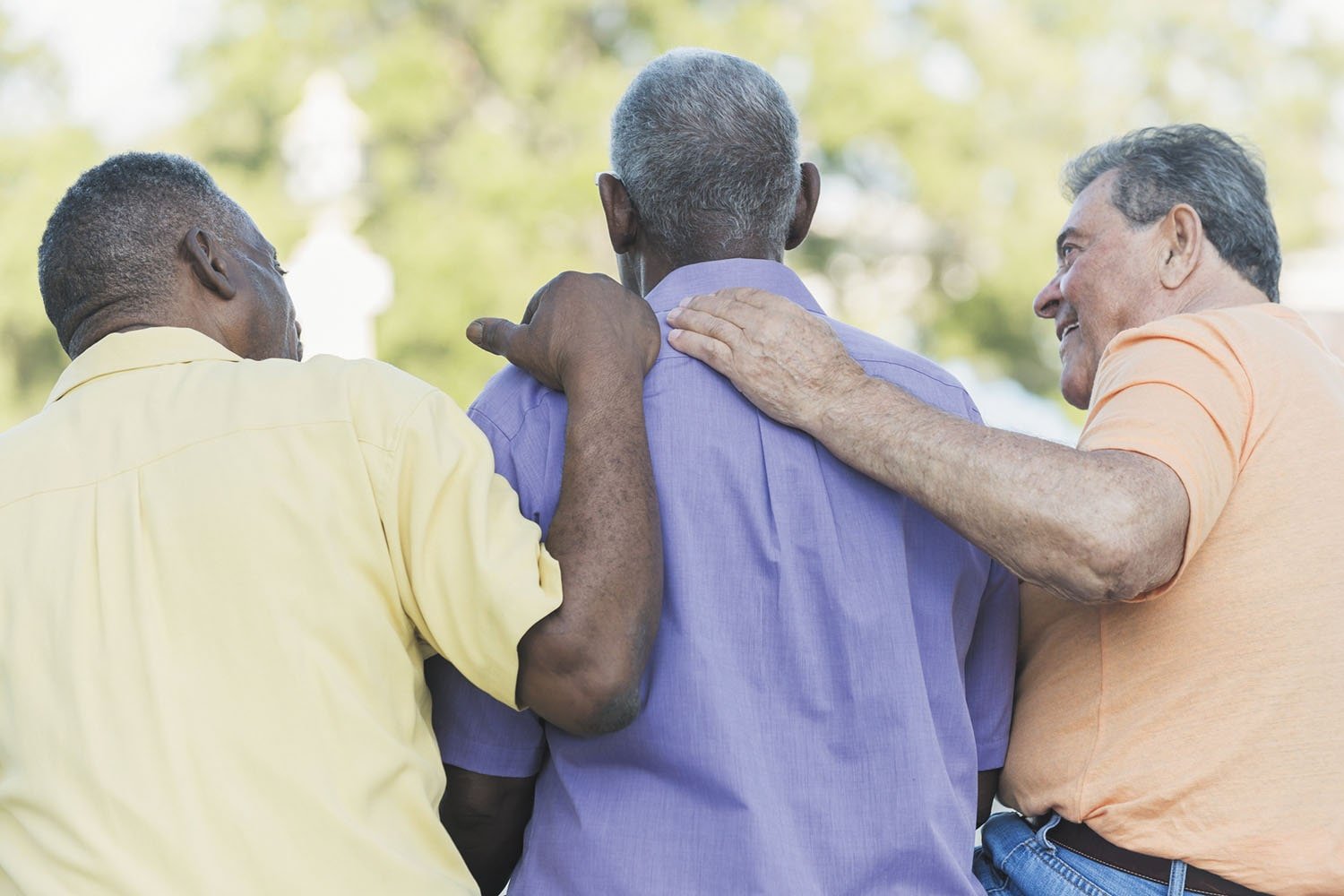Loss by Suicide Community
Surviving the loss of a loved one by suicide is one of the most traumatic, complex and potentially debilitating losses a person can experience.
Whether present at the death or not, suicide can create shock and persisting trauma. The range of thoughts and emotions experienced are extensive and generally very powerful. Disturbing images, sleepless nights with frequent nightmares, combined with intense anger, confusion, an inability to concentrate, waves of hopelessness and a lack of interest in continuing with life may be common. The stigma of suicide in our culture makes processing this grief even more difficult.



Following a loss by suicide, it is important to take good care of yourself in every way.
- Grief is exhausting and you will need to work hard to get plenty of quality sleep
- Eating healthy food will be a key, and simple exercise like walking combined with sunshine and fresh air will help you physically
- For your mental health you will need help with how to think about your loss. Tools are available to help you deal with recurring traumatic images
- Reflecting on the meaning and purpose of your loss will strengthen your spiritual life, and surrounding yourself with a few positive, loving people will provide much-needed support
- Your emotional battery will drain quickly so find ways to charge it regularly by treating yourself and remembering your own worth and value against the background of your loss
- Seek companionship in your grief and take every opportunity to talk about what you are experiencing with people you trust
We can connect you with others experiencing a loss by suicide and the commonalities in the nature of the relationship and the loss. You may also want to connect with the relationship community specific to your loss.
Community Connection
Grief doesn't simply go away... you need help.
- Connect with others who have experienced your same loss
- Interact through workshops on loss topics
- Find help through print resources you can view or download
Help for Grieving a Loss by Suicide
Bringing grieving people together to heal.
We Grieve offers companionship and support for healthy healing through connection in loss communities, virtual workshops, and print resources.
Surviving the loss of a loved one by suicide is one of the most traumatic, complex, and potentially debilitating losses a person can experience. Whether present at the death or not, suicide can create shock and persisting trauma. The range of thoughts and emotions experienced are extensive and generally very powerful. Disturbing images, sleepless nights with frequent nightmares, combined with intense anger, confusion, an inability to concentrate, waves of hopelessness and a lack of interest in continuing with life may be common. The stigma of suicide in our culture makes processing this grief even more difficult.
Engaging in this community will be critical as a person affected by suicide. Decide now that you will be intentional about your involvement, and unafraid to connect with others experiencing this loss. You will need all the support you can get! Many of you will also be members of another community, the community specific to your loved one – Loss of Partner or Loss of Child for example. Be kind to yourself and avid in your self-care. Reach out for the support you need.
Common Reactions to Loss by Suicide
Shock & Trauma
When experiencing a loss by suicide, disbelief and emotional numbness is likely to set in. You will find it hard to believe that your loved one was capable of taking their life, or that they actually followed through on a threat. It is simply hard to believe it is real – it just doesn’t seem possible. There is no way they are gone – they would never take their own life.
Losing your loved one in this way, you have suffered a severe emotional shock. There may be no worse traumatic loss than a loss by suicide. It is sudden and usually unexpected. There is really no way to prepare yourself for this loss. Suicide can be a violent loss and has the power to destroy close interpersonal relationships and absolutely impacts personal roles.
Suicide rips your loved one from your life and has the capacity to temporarily shatter you emotionally and leave you changed in many ways.
Suicide overwhelms anyone affected, and contrary to what some say, it is not “painless.” Loss by suicide is incomprehensible to anyone who has not lived it. It is a complex and utterly complicated loss.
It is normal to continue to experience intense reactions during the weeks and months after your loved one’s suicide — including nightmares, flashbacks, difficulty concentrating, social withdrawal and loss of interest in usual activities — especially if you witnessed or discovered the suicide. You will need to connect with loving and caring people who provide you with a safe space to come to terms with this loss.
Anger & Betrayal
Anger and betrayal are common reactions to a loss by suicide. You may be angry with your loved one for abandoning you or leaving you with a legacy of grief, or angry with yourself or others for missing clues about suicidal intentions. Sometimes those with clinical depression or strong suicidal ideation promise they would never complete suicide, until they do, and you are left angry and betrayed.
Guilt & Shame
Feelings of guilt and shame almost always accompany a loss by suicide. It would be a normal reaction to find yourself replaying “what if” or “if only” scenarios in your mind, blaming yourself for your loved one’s death.
“Why didn’t I know how serious this was?”
“Wasn’t my love enough to save him?”
“Why didn’t I get her some help in time?”
“How did I fail him?
“What will people think?”
Feeling responsible for the death of a loved one is a common response to suicide loss, and those who experience it must work through it in their own time and their own way. It will be important to understand that no one has complete control over another person’s actions.
There is a very real stigma in our culture with suicide. Many will not use the word when talking about the way their loved one died and may even lie to cover it up. There is so much cultural confusion and pain associated with suicide that potentially comforting friends may avoid talking about it altogether. We absolutely do not want our loved-one’s entire memory to be defined by the way their life ended, potentially diminishing or tainting it by suicide.
Deep Sadness & Despair
Experiencing a loss by suicide we feel gripped by sadness, loneliness and possibly helplessness. Physical collapse is possible, and you may even consider suicide yourself. Feelings of profound sadness accompany grief from a loss by suicide.
A common nuance of sadness as it relates to loss through suicide is sadness over lost potential, the hopes and dreams never realized, and all the what-could have-been’s. Feelings of despair are normal, or the complete loss of hope. The surprise, traumatic nature, and finality of a loss by suicide creates deep despair.
Confusion
A common human experience is to try to make some sense out of the death or an attempt to understand why your loved one took his or her life. Regardless of this search, there will likely be many unanswered questions. Feelings of vulnerability and a sense of being threatened by the mystery of suicide will follow. Having a loved one complete suicide creates a huge sense of the inability to control so much of our lives.
Loss of Control
In almost every suicide loss, there are debilitating feelings of a loss of control over your life, accompanied by a sense of powerlessness. You may find yourself questioning your faith. Loss by suicide creates an intense fear of change, and the pain of an inability to control another person’s choices.
Feelings of Rejection
One of the most discouraging emotions following a loss by suicide is wondering why your relationship wasn’t enough to keep your loved one from completing suicide. Feelings of abandonment are powerful, especially if the person completing suicide made promises to you or refused to reveal their true feelings or share the depth of their despair.
Relief
For many friends and family, the weeks, months, and sometimes years leading up to the death of a loved one through suicide have been a rollercoaster of emotion. In many cases there have been repeated psychiatric hospitalizations, incarcerations, and/or stints in rehab facilities. It is normal to feel a sense of relief that the unpredictable nature of life has come to an end. Sadly, these feelings often cycle back to guilt or shame; it feels wrong to be relieved, though it is perfectly normal to grapple with these feelings.
Helpful Resources for Losing Someone to Suicide
Books
- Shattered: From Grief to Joy After My Son’s Suicide
Rebecca Tervo - No Time to Say Goodbye: Surviving the Suicide of a Loved One
Carla Fine - After Suicide
John H. Hewett - After Suicide Loss: Coping with your Grief
Jack Jordan

We Grieve Workshops
Grief Workshops are open to all loss communities and are offered on a variety of topics.
Grief Workshops utilize a virtual platform and include teaching and small group, loss-specific breakouts with discussion enabled by a trained community facilitator. Workshops are scheduled for 90-minute sessions meeting weekly for four consecutive weeks.
Register for the next Grief Workshop:



Make a Donation
If the We Grieve Community experience has been valuable to you, give back.
Your donation will go to offset the cost of We Grieve, and allow us to continue offering free resources, workshops, and connection for grieving people.
Make a Donation



